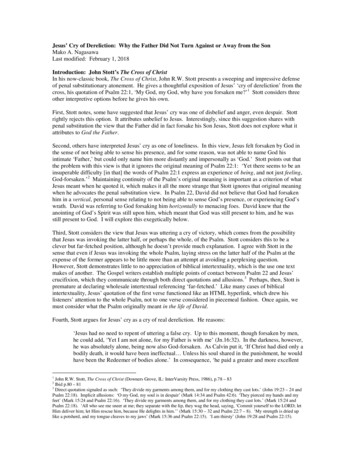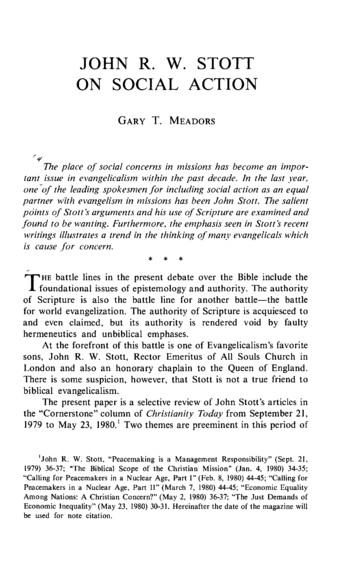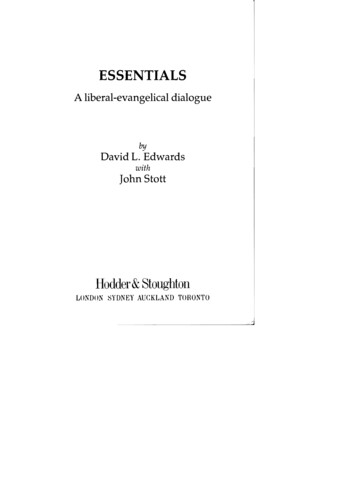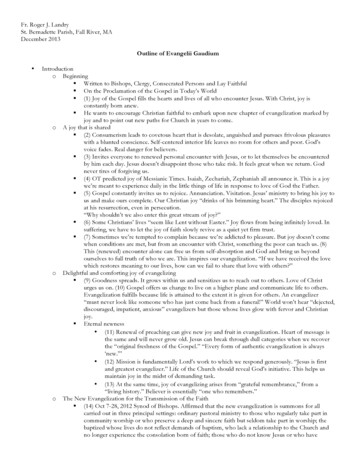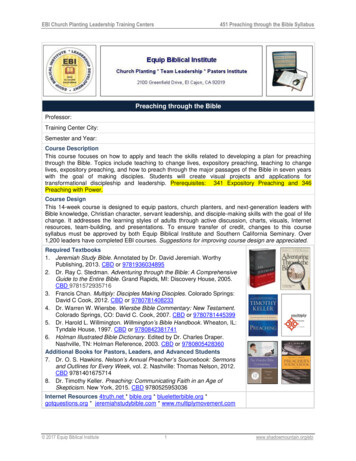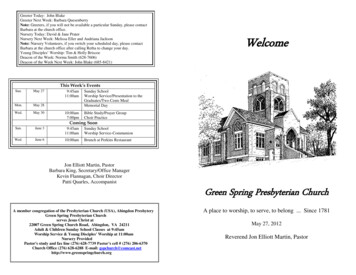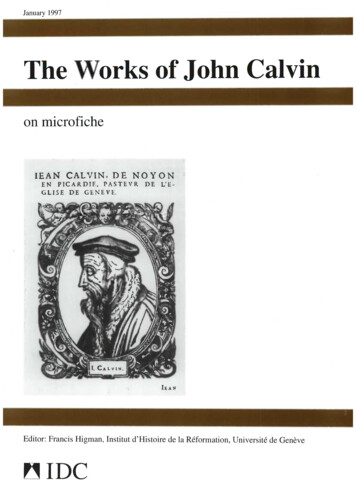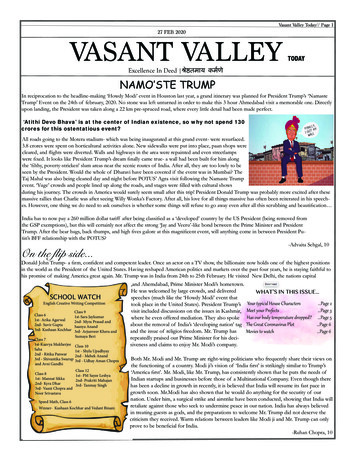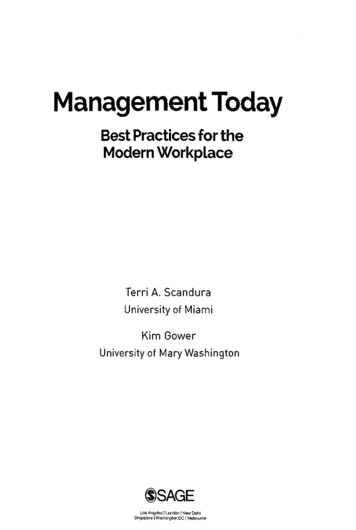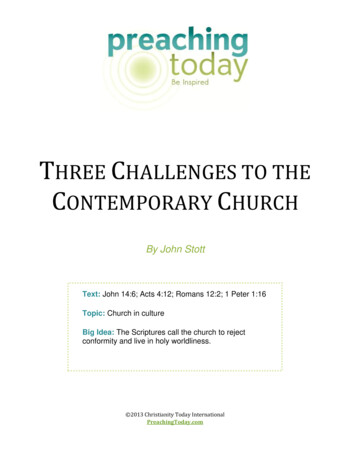
Transcription
THREE CHALLENGES TO THECONTEMPORARY CHURCHBy John StottText: John 14:6; Acts 4:12; Romans 12:2; 1 Peter 1:16Topic: Church in cultureBig Idea: The Scriptures call the church to rejectconformity and live in holy worldliness. 2013 Christianity Today InternationalPreachingToday.com
Sermon Outline:Introduction The church has a double calling: on the one hand to live in the world, and onthe other not to conform to the world. We have no liberty to respond to one call without the other. Between the two temptations of escapism and conformism, the latter is morecommon—that is, accommodation to the prevailing culture. One of the major themes of the whole Bible is that God is calling out a peoplefor himself—for his possession and for his glory—and that he summons hispeople to be different from the world around them. He says, “Be holy becauseI am holy.” This fundamental theme is founded in each of the four major sections of theBible: the law, the prophets, the gospels, and the rest of the New Testament. This is the radical biblical call to nonconformity to the surrounding culture.Now we need to ask ourselves, What are the pressures of our culture towhich we are forbidden to conform?The challenge of pluralism Today, at the end of the 20th century, this intellectual triumphalism of theEnlightenment has gone. Postmodernism is a self-conscious reaction againstthe rationalism of the Enlightenment. The only confidence today is that we lack all confidence. Postmodernismasserts that there is no such thing as objective truth. Pluralism does not just affirm the obvious fact that there is a plurality ofcultures and ideologies and religions in the world. It says that all these claimsshould be respected equally. Illustration: There was a social worker in Nigeria who not long ago wasvisiting a young man in one of the back streets of Lagos. On the bedsideof this student he had seven different books representing sevenworldviews. How should Christians respond to today’s pluralistic mood? With greathumility and with no element of personal superiority or arrogance, we haveto maintain that there is such a thing as objective truth. We do not claim the finality and uniqueness of Christianity in any of itstraditional formulations. We are claiming uniqueness and finality only forJesus Christ.Three Challenges to the Contemporary Church Preacher PreachingToday.com2
Illustration: Saduh Sundar Singh was a Sikh who was born and broughtup in a Sikh household. When he was about 15, he was converted toChrist. “The particular thing I have found,” replied Saduh Sundar Singh,“is Christ.” Wherein lies the uniqueness of Jesus? His uniqueness is found supremely inthree things:o Incarnationo Atonemento Resurrection Only in Jesus of Nazareth did God become human in his birth, bear our sin inhis death, and triumph over death in his resurrection. He is uniquelycompetent to save. He has no rivals. He has no competitors. And he has nosuccessors.The challenge of materialism The Western world is almost unbearably affluent in contrast to thedeveloping world. To visit a North American or European supermarket is tobe exposed to a choice of goods so wide as to be positively obscene. Materialism means a preoccupation with material things. Jesus warned us not only against greed and materialism but against a falseambition—preoccupation with what we eat and drink and wear. The apostle Paul also calls us to a lifestyle of simplicity and contentment. We would be wise to travel light because there is no doubt that we shall leaveeverything behind. Illustration: There was a wealthy lady who died. “How much did sheleave?” The pastor had the wisdom to reply, “She left everything.” Paul says that if we have food and clothing and shelter and the necessities oflife, let us be content. Illustration: There was a young American guy who found a five dollarbill on the sidewalk. After that moment he never lifted his eyes whenwalking. From that time on, he accumulated 29,516 buttons, 54,172pins, 12 cents, a bent back, and a miserly disposition. The tragedy is that, just as the Christian church is becoming so materialistic,there are many outside the church who are rejecting materialism. May God deliver us from materialism.The challenge of moral relativismThree Challenges to the Contemporary Church Preacher PreachingToday.com3
All around us moral standards are slipping, certainly in the West andincreasingly elsewhere as television creates a monoculture. Moral relativism has permeated our culture and seeped into the church. The most obvious example of moral relativism is in sexual ethics. But over against these trends, Jesus Christ calls his disciples to obedience. Any concept of obedience is impossible if there are no moral standards weare called to obey. Obedience presupposes such absolutes. Jesus said, The only way to prove we love Christ is by our obedience. He is what we say he is, and we have no liberty to disagree with our teacherand no liberty to disobey our master.Sermon TranscriptLet’s pray before I begin so that we may look to him for light. I’d like to use a prayer thatJohn Calvin wrote in the 16th century that expresses what is in my heart and I hope what isin yours as well.Heavenly Father, in your Son Jesus Christ are hidden all thetreasures of wisdom and knowledge. Enlighten our minds by yourHoly Spirit and grant us that reverence and humility without whichno one can understand your truth, through the same Jesus Christour Lord. Amen.The church has a double calling: on the one hand to live in the world, and on the other notto conform to the world. The first is a call to worldliness, as opposed to otherworldliness—getting involved in the life of the world around us. The second calling is the call to holiness.We have no liberty to respond to one call without the other. Indeed, we may neitherpreserve our holiness by escaping from the world, nor may we sacrifice our holiness byconforming to the world. Escapism, on the one hand, and conformism, on the other, areequally forbidden to Christian men and women. Instead we are to combine both callings toinvolvement and to separation. We are to develop what Dr. Alec Vidler, an Anglican scholarof the former generation, in his book Essays in Liberality called “holy worldliness.” Are youfamiliar with that title? It’s a very good title to sum up what we are called to be and to do.We’re called to holy worldliness.We are exposed on every side to cultural pressures. Between the two temptations ofescapism and conformism, the latter is more common—that is, accommodation to theprevailing culture. We are exposed to cultural pressures incompatible with the Lordship ofJesus Christ, which, nevertheless, are demanding from us a capitulation that we are notThree Challenges to the Contemporary Church Preacher PreachingToday.com4
prepared to give. And if we do capitulate to the pressures of society around us, then wecompromise our integrity, we blunt our testimony, and we suffocate our spiritual life.One of the major themes of the whole Bible is that God is calling out a people for himself—for his possession and for his glory—and that he summons his people to be different fromthe world around them. He says, “Be holy because I am holy.” This fundamental theme isfounded in each of the four major sections of the Bible: the law, the prophets, the gospels,and the rest of the New Testament. This is a continuing theme throughout the developmentof God’s revelation of himself in Scripture.Take the law, to begin with. In Leviticus 18:1 and following, God says through Moses to hispeople, “You shall not do what they do in the land of Egypt where you used to live, and youshall not do as they do in the land of Canaan into which I’m bringing you. You shall notfollow their practices. You must obey my laws and follow my decrees.” Now there is a callto radical nonconformity. They were not to conform to the ways of either the Egyptians orthe Canaanites but to be different from surrounding culture.Do you remember God’s complaint to the people in Ezekiel 11:12? It’s very similar inlanguage: “You have not followed my decrees. You have not kept my laws. But you haveconformed to the standards of the nations around you.” God complains that his peoplewere conformists. This is found, again, in 2 Kings 17:15: “They imitated the nations aroundthem, although the Lord had ordered them, ‘Do not do as they do.’”So then we move onto the third section, the teaching of Jesus in the Gospels, and we findthe same teaching in Matthew 6:8: “Do not be like them.” The Pharisees are one model ofleadership. There is a pagan and secular model, on the other hand. In both cases, Jesus said,“Do not be like them.” The fourth example in the epistles is the well-known summons of theapostle Paul: “Do not conform any longer to the fashions of the world around you.”This is the radical biblical call to nonconformity to the surrounding culture. Now we needto ask ourselves, What are the pressures of our culture to which we are forbidden toconform? What are the contemporary trends which threaten to envelop and engulf thechurch and against which we need to be on guard? I have selected three. I’m sure there aremany more we could discuss, but these three are very important.First there is the challenge of pluralism: the church is called to be a community of truth.Second there is the challenge of materialism: the church is called to be a community ofpilgrimage. Third there is the challenge of moral relativism: the church is called to be acommunity of righteousness.In each case we’ll try to understand the contemporary trend, evaluate its challenge, andconsider how the church should respond to it.The challenge of pluralismThree Challenges to the Contemporary Church Preacher PreachingToday.com5
Two hundred and fifty years ago, western leaders of the Enlightenment had boundlessconfidence in the autonomy of the human reason and in its ability, particularly throughscience, to discover truth and dispense with revelation and with tradition. Today, at theend of the 20th century, this intellectual triumphalism of the Enlightenment has gone.Postmodernism is a self-conscious reaction against the rationalism of the Enlightenment.The only confidence today is that we lack all confidence. Postmodernism asserts that thereis no such thing as objective truth. The only truth is what seems to be true to me, and it maybe quite different from what seems to be true to you. There is neither meaning nor purposein our existence, and all we have is a plurality of subjective, culturally conditioned opinionswith no objective criterion by which to judge between them.The correct name for this aspect of postmodernism is pluralism. Pluralism does not justaffirm the obvious fact that there is a plurality of cultures and ideologies and religions inthe world. It goes beyond that. It says that all these claims should be respected equally, andwe must therefore affirm the independent validity of every religion and every ideology. Wemust therefore give up the naïve and arrogant notion that we should try to convertanybody, let alone try to convert everybody. To those who have embraced pluralismnothing is more obnoxious than the Christian claim to uniqueness and the concept of worldmission and world evangelization. Pluralism is an ideology that affirms the independentvalidity of every system or faith.Maybe I could show you with a little story that illustrates the mood of today. There was asocial worker in Nigeria who not long ago was visiting a young man in one of the backstreets of Lagos. On the bedside of this student he found the following books: the Bible; theBook of Common Prayer, I’m glad to see; the Koran; three copies of Watchtower, themagazine of the Jehovah’s Witnesses; a biography of Karl Marx; a book of yoga exercises;and a popular paperback that he particularly needed entitled How to Stop Worrying. That istypical of the modern mood, a mood of syncretism and of pluralism.How should Christians respond to today’s pluralistic mood? With great humility and withno element of personal superiority or arrogance, we have to maintain that there is such athing as objective truth. God has revealed himself to the world not only in the orderedloveliness of the created universe but supremely in Jesus Christ and in the full biblicalwitness to Christ. Jesus Christ is God’s Son, the Word, who became a historical humanbeing. He is the rock on which the church is built, and the church has no liberty to tamperwith its own foundations. Its calling is, on the one hand, to defend and preserve the truththat has been entrusted to it and, on the other, to proclaim it without fear or favor to thewhole world. The existence of truth revealed, objective, and accessible is fundamental tothe life of the church. The church is a community of truth. The church is built upon thefoundation of the apostles and prophets, and it is a community confessing, guarding, andcommunicating the truth, committed to it.At this point notice and declare the nature of this truth claim. We do not claim the finalityand uniqueness of Christianity in any of its traditional formulations, whether Catholic orOrthodox or Protestant or Reformed or Baptist or Pentecostal. We’re not even claimingThree Challenges to the Contemporary Church Preacher PreachingToday.com6
uniqueness for the church in any of its cultural manifestations in Latin America, Asia,Africa, or the West. We are claiming uniqueness and finality only for Jesus Christ.Saduh Sundar Singh was a Sikh who was born and brought up in a Sikh household. When hewas about 15, he was converted to Christ through some kind of vision and became anitinerant Sadhu, or holy man, until he was lost in the Tibetan mountains. He once wasaccosted by an agnostic professor of comparative religions in a Hindu college who askedhim what he’d found in Christianity that he had not found in his old religion. “I have Christ,”he replied. “I know,” sa
By John Stott Text: John 14:6; Acts 4:12; Romans 12:2; 1 Peter 1:16 Topic: Church in culture Big Idea: The Scriptures call the church to reject conformity and live in holy worldliness. THREE CHALLENGES TO THE CONTEMPORARY CHURCH 2013 Christianity Today International PreachingToday.com. Three Challenges to the Contemporary Church Preacher PreachingToday.com 2 Sermon Outline:
